“It’s Only a Paper Moon”
Written by David Mack & John J. Ordover and Ronald D. Moore
Directed by Anson Williams
Season 7, Episode 10
Production episode 40510-560
Original air date: December 30, 1998
Stardate: unknown
Station log: Nog is coming back to DS9, and Rom and Leeta are both nervous. Rom is worried he’ll say something stupid and Leeta is worried she’s intruding as she isn’t “real family.” (Rom insists that she’s completely real family.) In addition to his father and stepmother, Quark, Jake, and the entire senior staff greet Nog at the airlock with applause. He’s walking with a cane and is extremely subdued. He declines to attend his own welcome-home party, responds not at all to the good-natured teasing on the part of Sisko, O’Brien, and Bashir, and refuses Jake’s offer to carry his bags.
Dax catches Nog up on what he missed while he was away, and Nog himself is defensive on the subject of his cane, since the doctors told him his leg was fine and the pain he feels that forces him to limp is psychosomatic.
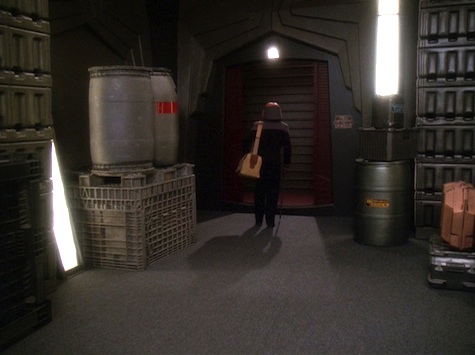
Three days pass, and Nog misses two physical therapy sessions, his counseling sessions with Dax have gone nowhere, and Jake reports to his father that Nog is sleeping eighteen hours a day. What Jake doesn’t mention is how often his roommate plays Fontaine’s rendition of “I’ll Be Seeing You” over and over again, to the point where an aggravated Jake yanks the song out of the player and tells him to go rent a holosuite if he wants to hear it again, because Jake can’t stand it anymore.
So Nog takes his advice and starts up Fontaine’s program. After introducing himself to Fontaine—and Fontaine saying that Rom is always coming in and bragging about his kid—Nog requests the song, saying it helped him when he was unhappy. After Fontaine plays fifteen different arrangements of the song, Fontaine sits and talks with Nog for a bit, and Nog admits that he doesn’t want to go back to his life. His medical leave orders say he can choose his own rehab facility, and he decides that he wants Fontaine’s hotel suite in “1962 Las Vegas” to be that facility.
Nog’s nearest and dearest are concerned to say the least. Sisko meets with Dax (his therapist), Bashir (his doctor), Jake (his best friend), and Quark, Rom, and Leeta (his family) to discuss whether or not his taking refuge on the holosuite is such a hot idea, but Dax thinks it might be his way of seeking out therapy. Sisko suggests that Dax talk to Fontaine and make sure the hologram’s aware of the situation.
Nog is spending his time watching Westerns in Fontaine’s suite. He is less than impressed with the ending of Shane—he was shot, he should be bleeding at the very least. Before heading down to do his show, Fontaine gives Nog a new cane, a replica of Errol Flynn’s (only shorter, and with a lighter).
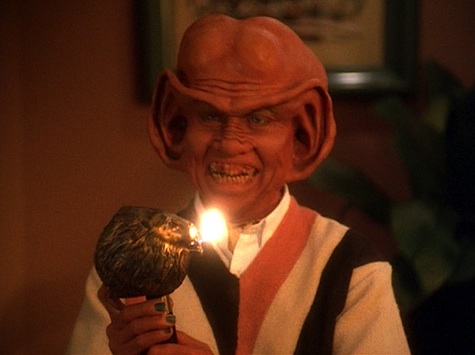
Jake brings a date named Kesha to the holosuite and joins Nog at his table. When Jake goes to get drinks, Kesha says that Nog’s a hero, according not only to Jake but everyone on the station. The conversation gets more and more awkward, and when Jake comes back, Kesha wants to leave, as she thinks she said something wrong. It devolves into an argument between Jake and Nog, which ends when Nog throws the table at Jake and then punches him (moving very quickly and easily and without the cane). Fontaine immediately throws Nog out of the lounge.
After the set, Fontaine comes to the suite to see Nog watching TV. When he reveals that he slugged his best friend because he called Nog a hero, Fontaine says, “Remind me never to give you a compliment.” Nog can’t explain why he fought with Jake, and he promises to make things right with him and Kesha. He also offers to straighten out the casino’s finances, which Fontaine says are a mess.
Nog determines that the casino’s actually doing better than Fontaine realizes and that he can expand. When Dax comes by to see how he’s doing—and also recommend that he leave the holosuite—Nog refuses, saying he has work to do with Fontaine to expand. Fontaine goes along with it, pointing out to Dax that the kid’s had a bit too much reality lately and could use some fantasy.
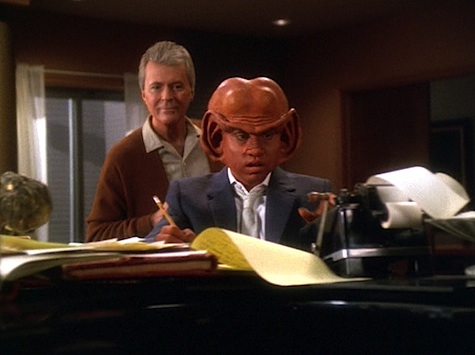
After a few days, Dax checks in again to see that Nog has completely thrown himself into the role of Fontaine’s business partner. Rom and Leeta come in to see how Nog is doing, and also reveal that Rom has been promoted. Nog offers to throw him a party, but O’Brien threw one for him the previous night. Nog brushes off missing it and goes off to deal with some high rollers who have walked in. Dax talks to Fontaine, who thinks he’s doing great, but Dax also believes that Nog’s “rehab” is part of Fontaine’s plan to get him out of the holosuite. But in fact, Fontaine is just acting as part of the program, and he’s been enjoying being, in essence, a real person with a life. He’s never been on for more than a few hours at a time before, and he’s loving it.
Now it’s time for him to return the favor and let Nog have his life back. When Nog refuses to go, Fontaine turns off the holosuite, leaving Nog alone with his old cane. Nog tries to reactivate the program, but it won’t work—as O’Brien explains, Fontaine can turn himself on and off at will, and if he doesn’t want to come online, he won’t.
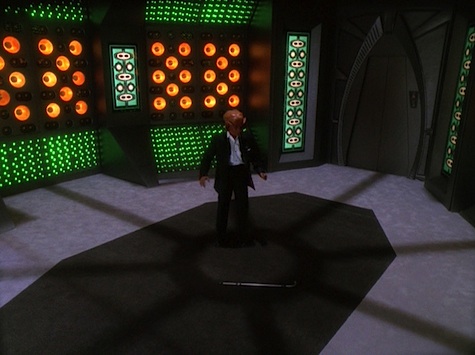
After O’Brien leaves the holosuite, Fontaine comes back and tells Nog to leave his program alone. Nog pours his heart out, telling Fontaine that he’s scared, afraid that he might die, afraid that he might get hurt worse next time. Fontaine reminds him that if he stays in the holosuite, he will die—but bit by bit instead of all at once.
Finally, Nog leaves the holosuite, leaving his cane behind. He goes downstairs to see Quark, Rom, and Leeta. Leeta asks if he’s okay, and he replies, “No, but I will be,” and then hugs his father and stepmother.
Nog goes back on limited duty, just a few hours a day, and returns to the holosuite to thank Fontaine for all he did. Fontaine thanks him for showing him what a real life is like, and Nog shows his gratitude further by telling Fontaine that he’s arranged with Quark to have the Fontaine program running twenty-six hours a day. Fontaine will have a real life from now on. To celebrate, he sings “I’ve Got the World on a String.”
Can’t we just reverse the polarity? Fontaine’s program is set up in such a way that he can control it—but when Nog asks if that means Fontaine has free will, O’Brien avoids the question with a McCoy-ism: “I’m an engineer, not a philosopher.”
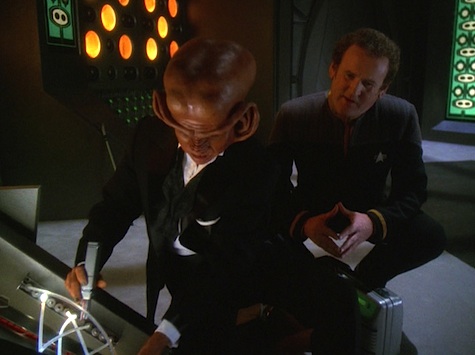
The slug in your belly: Dax continues to not impress as a counselor, though she starts out promising by letting Nog find his own way without overwhelming him with too much talking, when he’s already done too much. However, she blows it by actually believing that a hologram could do a better job than she can. And then, to make matters worse, the hologram actually does do a better job than she can. (Yes, it makes my head hurt, too.)
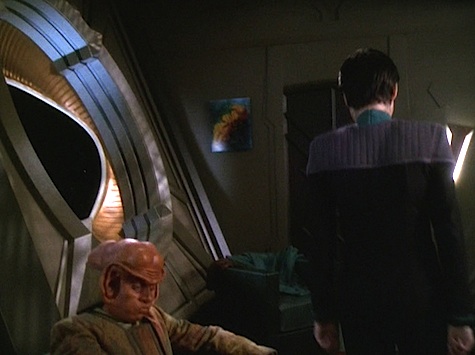
There is no honor in being pummeled: Since Worf only appears briefly in the teaser of this episode, and appears not at all in the next two (he’s not in “Prodigal Daughter,” and we only see his Mirror Universe counterpart in “The Emperor’s New Cloak”), it’s assumed that Worf’s appearance in Star Trek Insurrection commences right around this time period.
Rules of Acquisition: When Fontaine is struggling with his accounts, Nog perks right up. Fontaine’s query as to whether or not Nog knows anything about bookkeeping is somehow not met with the young Ferengi screaming, “DUH!”
No sex, please, we’re Starfleet: Jake brings a very lovely young Bajoran woman to Fontaine’s, who looks quite fetching in the ballgown. (Jake, of course, looks great in the tuxedo, but that’s because it’s impossible not to look good in a tux. Although, amusingly, the one person I’ve known who almost didn’t look good in a tux is the co-writer of this episode, John J. Ordover, who looked good in the tux he wore for his wedding for about half an hour before he managed to get all rumpled in it.)
What happens on the holosuite stays on the holosuite: Quark snidely asks who’s going to pay for Nog’s endless time in the holosuite, and then answers his own question by saying he guesses that he will. Sisko allows as how that’s incredibly generous of him.
Keep your ears open: “How can hiding in one of Julian’s adolescent programs be a good sign?”
“Hey.”
“It could be worse. He could be hiding in the Alamo program.”
“Or that ridiculous secret-agent program.”
“Hey…”
“Or that stupid Viking program.”
“Hey!”
Quark, Jake, Leeta, and Rom simultaneously worrying about Nog and making fun of Bashir, to the latter’s increasing dismay.
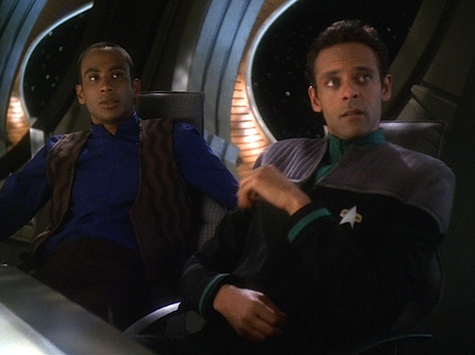
Welcome aboard: The main characters in this episode are actually guest stars, to wit, recurring regulars Aron Eisenberg and James Darren. We also get Chase Masterson as Leeta, Max Grodénchik as Rom, and Tami-Adrian George as Kesha.
Trivial matters: Obviously this episode is a sequel to “The Siege at AR-558,” as Nog deals with the aftermath of his injuries sustained in that episode. There are also two flashbacks to the events of “Siege,” including one scene of Bashir telling Nog about “I’ll Be Seeing You” that we didn’t see in the earlier episode.
The original pitch that David Mack and John J. Ordover sold to DS9 (at the same time that they sold “Starship Down”) was called “Everybody Comes to Quark’s.” Their notion was to have the entire episode set in Quark’s Bar, with an A, B, and C story. The plot sort of bounced around the writers room for a couple of years, and then it was resurrected when Nog had his leg blown off, and it was viewed as the right A story for Mack and Ordover’s pitch, though it was also re-set to the Fontaine holosuite program. Mack and Ordover were then hired to rewrite their story pitch to accommodate the new status quo, which Ronald D. Moore then wrote the script off of. However, as Moore wrote he realized that the B and C stories were too light and interfering with the dramatic impact of Nog’s PTSD, and so the episode wound up focusing entirely on that.
Nog and Fontaine preferring The Searchers to Shane is a minor in-joke, since the lead actor in the former was Jeffrey Hunter, who played Captain Christopher Pike in the first Trek pilot “The Cage.”
Fontaine sings “I’ll Be Seeing You” (both the recording from “The Siege at AR-558” and two different arrangements that we hear parts of live), “Just in Time” (in the background when Jake and Kesha come into the holosuite), “I’ve Got the World on a String” (at the very end), and, of course, “It’s Only a Paper Moon” (over the montage of Nog becoming Fontaine’s business partner).
Walk with the Prophets: “He’s a one-legged crazy man!” I was surprised when I realized that this was only two episodes after “The Siege at AR-558,” as I thought there was a longer gap, but a check of airdates revealed the source of my confusion: this episode actually aired five weeks after “AR-558,” as no new episodes aired during December 1998. Cha cha cha.
Anyhow, this is a superb episode. It’s a testament to the strength of DS9’s ensemble that it can give over an entire story to two characters who aren’t even opening-credits regulars and make it one of the show’s most compelling hours. Aron Eisenberg is simply superb here, raising the bar from his previous high point (his speech to Sisko in “Heart of Stone”) by tapping the same deep reservoir of emotion that he hit previously. Indeed, this serves as an excellent companion piece to “Heart of Stone,” because Nog joined Starfleet because he wanted so very much to be more than his father, and now that he’s seen the ugly reality of his choice, he wants to be something less than his father: the financial manager for a fictional casino. Jake, Dax, and Rom (and Fontaine, for that matter) all try to gently remind him that he’s acting like Fontaine’s place is real, and every time, Nog brushes it off or ignores it.
I also like the fact that Fontaine is treated like a program here. Yes, he is self aware and he seems real (Nog says as much at the end), but he can only do what he’s programmed to do. Nog wants to stay in the hotel, so Fontaine lets him stay in the hotel. When Dax suggests it’s time for Nog to come out, Fontaine resists, not because he thinks it’s good for Nog but because he’s the one who called for the program, so he’s who Fontaine is going to default to. It isn’t until Dax rather stupidly mistakes Nog’s progress for Fontaine having a master plan to help Nog get back to reality that Fontaine does the right thing and gets Nog out of the holosuite cold turkey. But he’s still a hologram—garbage in, garbage out.
This does an even better job than the episode it’s a sequel to at showing the horror of war by letting us see the toll it takes. Sure, 24th-century medicine is advanced enough to give Nog a leg that’s as good as new in less than a month, but the real damage wasn’t to his leg. Indeed, the damage wasn’t all to Nog: two of the most powerful (yet nicely understated, and points to director Anson Williams for that) scenes are the beginning when Rom and Leeta are struggling to figure out how to talk to Nog and later when the pair of them enter the lounge and are basically blown off by Nog who’s acting more like a maître d’ than their son. In particular the long shot of the two of them after Dax and Fontaine talk, holding each others’ hands looking absolutely miserable and alone at their table is just heartbreaking. And I like that Sisko gathers the people closest to Nog for the meeting in the wardroom rather than just a generic gathering of the senior staff—everyone there is someone important in Nog’s life, whether from a medical, friendship, or family perspective.
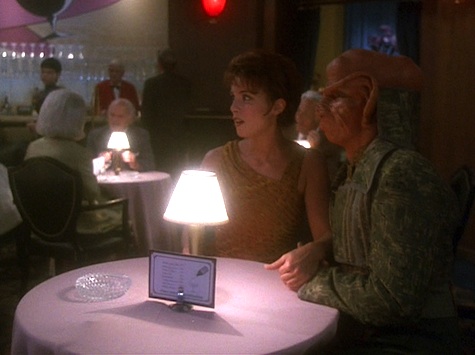
I took a point off for two reasons, one being the continued incompetence of Counselor Dax, and the other being a slightly unfair regret that the original “Everybody Comes to Quark’s” pitch never happened. As I mentioned in the “Starship Down” rewatch, story writers David Mack and John J. Ordover are two of my closest friends, so I know what we would’ve seen if what aired was closer to what they pitched, and there are some gems in the original that the world has seriously missed out on.
Warp factor rating: 9
Keith R.A. DeCandido hopes you all have a spectacular new year, and he looks forward to more rewatching goodness in 2015.










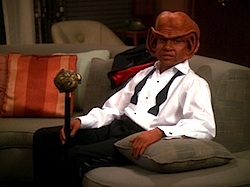
Yep, it’s a pretty good episode, and one of the few Ferengi (focused on Nog after all) that I actually enjoy.
I really liked this one (which probably goes without saying). In my mind, I’ve rated season 7 as kind of low, and it’s because when I used to think of season 7 there are some not-so-good moments that stand out. But I’ve actually been quite enjoying season 7 on the rewatch so far.
This episode actually warmed me up to Fontaine a bit too. I didn’t really like how pushy he was in “His Way” or some of his pre-programmed attitudes (which were perfectly in character for the type of person he was supposed to be). One of the downer moments of season 7 I’d always thought of is the upcoming Fontaine-centered episode, and I didn’t like that there was so much fuss about a character I never even cared about. But I hadn’t remembered or hadn’t seen all the Fontaine stuff inbetween “His Way” and that one, and now that episode makes more sense to me that the crew would feel that strongly about it. And anyway, like I said, this episode has kind of warmed me up to him a little bit.
On the other hand, leaving his program run all the time kind of makes him like Voyager’s doctor now, but I feel like that implication is not really dwelled upon much except for that other episode coming up. And that’s kind of disappointing. The other thought I had is whether that means an entire holosuite of Quark’s is now constantly being used up. From “Ship in a Bottle,” it seems like they are able to keep the program running in memory without being projected, so Moriarty thought he was experiencing things. I don’t know why they can’t do that with Fontaine instead of cutting into Quark’s business.
Also, in terms of being able to turn himself on and off and stay off, I wonder if he is perceiving something while being deactivated (kind of like how Moriarty mentioned brief, terrifying moments of conciousness). So he is able to at least act out some of his will while in a deactivated state, but presumably having the program running is desireable.
As for the hologram being a better counselor than the counselor, I feel like they are running with the same pattern of “counseling is just advice,” and don’t treat it like there’s any research or qualifications involved.
I’m less skeptical about Vic’s sapience or free willed-ness. I think he did have something of a “master plan” for letting Nog work through some things in a low-pressure environment, in addition to Vic’s own ulterior motive of experiencing an ongoing existence.
Part of why I think that may be due to one of my favorite things about the episode: the lyrics of It’s Only a Paper Moon, which fit BRILLIANTLY. The classic jazz piece was presumably intended as a love song, a sappy message about how being with the right person makes you see/imagine the world with rose-colored glasses. Even in that form, I like it just because the music is catchy.
But the song works much better (IMO) as a message about the virtues of moderate escapism (through media such as books, movies, and games, since we don’t have holodecks), written from the perspective of the media themselves. Which makes a lot more sense when sung by a self-aware hologram.
So Vic is singing to Nog, “It’s a Barnum & Bailey world, just as phony as it could be, but it wouldn’t be make-believe if you believe in me.” Meaning, if you believe in this casino-running life, and immerse yourself in it enough, the healing of your psychosomatic pain while you’re distracted here will help you heal for real, too. So he really was looking out for Nog’s welfare, and showing some good psychological intuition of his own.
Along with this view of Vic, I don’t think Dax is all incompetence either. Oh, she certainly is incompetent at the start of the episode, and makes mistakes, but she is wise (and humble) enough to recognize the therapy that Nog might be able to get out of the holoprogram — and also wise enough to shut it off before it goes too far.
@2: I always sort of imagined that Enterprise-D had a much more sophisticated holodeck than you can get at Quark’s holosuites. I therefore never expected many of the things that went down with the holodeck on the Federation’s flagship to be possible in a civilian space on an aging, occupied Cardassian base.
It always felt to me that, instead of Dax stupidly assuming that Vic had a master plan during that last conversation between them, she knew very well why Vic hadn’t done anything and was subtly manipulating him to come to that realization on his own, since being upfront about it didn’t work the last time. To me, that was one of the few examples of Dax actually being a competent counselor, rather than a total oblivious nitwit.
I’m sorry but I think you’re a little rough on Dax when you say she “stupidly” assumes that Fontaine has a bigger plan to get Nog out of the holosuite. The way I remember it is that she’s taking the indirect route to get Fontaine to do what has to be done. Confronting him didn’t work so she’s all “Oh wow you’re a genius to come up with this plan because, like, you know, it wouldn’t be fair to Nog if he thinks all this casino planning is real and everything.” And Fontaine is all “Uh, yeah. Sure. You bet.”
It’s been a while but I remember thinking that Ezri was finding her feet at last – and I was not a fan of the character at first so I was relieved.
Yeah – I totally thought Dax was using reverse psychology on Fontaine (but then, I thought she was using it on Garak, and she totally wasn’t…). And I think I’m actually a little more open to the idea that Fontaine had his own motives than just what was programmed than your review seemed to be.
Overall, I really liked this episode though! I really like Nog, and Rom and Leeta remain the cutest family ever.
Not much to add — it’s a surprisingly effective episode for one that focuses only on guest players (but then, the same went for TNG: “Half a Life”), and I also sometimes wish we’d gotten to see the original “Everybody Comes to Quark’s” proposal.
@2: A Galaxy-class ship has the most advanced mobile computer in the Federation, according to “11001001,” so it can afford to keep a program running on standby when it’s not in use. But Ferengi-designed commercial holosuites like Quark’s are probably stingier in their power and memory usage by design as well as necessity.
Then again, you have a point that if he can voluntarily turn himself on, that implies some level of awareness while inactive.
@3: I don’t know if Keith is saying Vic isn’t sapient, just that he has the psychology of a computer program. Even if he is self-aware, his nature as a service/recreational program gives him certain “instincts” and drives that would shape his choices — just like the Voyager EMH is instinctively driven to heal the sick and injured.
As for the song, here’s a piece about its origin and intent. It was written for a character who was a carnival barker, used to existing in a fake, chintzy environment and rather cynical about the world as a result. I think the idea was that being in love was the only real thing in his life, that it gave meaning to a world that seemed meaningless otherwise.
@5, 6 & 7: You’re right about Ezri. No doubt, in that last talk with Vic, she’s totally playing him, making him realize the selfishness of what he’s doing.
I’ve heard the argument that Dax was playing Fontaine before, and I don’t buy it because I’ve seen nothing in Counselor Dax’s character that indicates that she’s even capable of doing her job properly and neither the script nor the actor gives any indication that it’s a fakeout. (Counselor Tigan maybe could’ve done it. But Counselor Dax has only been poor at her job so far.)
—Keith R.A. DeCandido
I agree whole heartedly with the comments above. I’ve always read the Vic/Ezri conversation as her manipulating him. She forced him to see that he was being, however unintentionally, selfish, putting his joy at actually having a life ahead of Nog’s well-being. He realized that, and shut down the program.
@9: I think the actor DOES give an indication that it’s a fakeout, in that she uses a sarcastic tone of voice.
Anyway, another thought: Was it typical for lounge singers in 60s Vegas to also be the casino owners?
@9 – funny, to me, her interaction with Fontaine WAS the indication to me that she could do her job, or was at least starting to come back to herself a bit (as opposed to the scene with Garak where she really was just rambling and incompetent).
@11: It’s unclear whether Vic Fontaine is a recreation of a person who really lived in the Trek universe’s 20th century or a fictional character created by programmer Felix. If he’s fictional, then he could easily be made the owner of a casino without regard for real-world logic. For that matter, even if he’s based on a real historical figure, the program could fictionalize the details of his life.
Sorry, I know this is a minor quibble, but surely the “lead actor” in “The Searchers” was John Wayne?
@8 Don’t forget TNG’s Lower Decks which is all about secondary (even heretofore unseen) characters that was absolutely stunning.
and krad, I have to go in with everyone else in the interpretation that Dax was playing Fontaine…
I watched this before the holiday, so I may be rusty on Dax’s interaction with Fontaine. But I find it somewhat implausible from a fictional-universe perspective that Ezri’s skills advanced that quickly. I’m not saying she’s not capable of it, she might be a very fine counselor someday. And I don’t mean to reference anything from the script or the actress – speaking from a strictly fictional perspective, could she really have gone from her previous fumblings to such subtle techniques so quickly?
@16: Honestly, I didn’t think it was particularly subtle. I’ve always found the scene to fairly ooze with reverse psychology.
@16: I agree with #17. Also, remember that Ezri wasn’t meant to be incompetent in-story. She was supposed to be a decent counselor, decent enough that Sisko found her useful on the station staff. After all, she wouldn’t have gotten through Starfleet Academy if she weren’t extremely smart and capable. It’s just that the writers did a poor job portraying competent counseling, so that what they intended to be at least moderately competent comes off to viewers as inept.
So it’s not that Ezri suddenly got better at her job, it’s that the writers got better at portraying her doing her job.
@18 – Exactly so. Counseling is one of those jobs that seems like it should be easy to do, but in reality it requires training and knowledge to get it right. Which is probably why it’s hard for writers to portray it well on TV. The other problem is that real counseling is usually slow, tedious, and doesn’t have sudden, dramatic breakthroughs. In other words, watching it would be boring as all get out. Not good TV. I’ll give Dax a pass on what we see of her counseling skills and accept that she’s supposed to be good at her job.
Well, it was subtle enough that our humble rewatcher missed it… <g,d,r>
@11 & 13
I don’t know it if was common, but Frank Sinatra was owner of the Cal Neva casino in Lake Tahoe, so it certainly wasn’t unheard of. It became notorious, of course, as the location where Sinatra would hang out with the Kennedy’s, Marilyn Monroe and other Hollywood stars and mob bosses including Sam Giancana, so undoubtedly the ST scriptwriters would have been aware of it, and seeing as they were making Vic a Sinatra-esque character they may well have had that in mind.
Yeah, I’ll just throw my lot in with most others here.
Even as a kid watching this episode for the first time I thought it was obvious that Dax was being sarcastic when speakign to Fontain that last time.
It’s her tone of voice, how she’s just Asserting so strongly how well Vic is doing that shows it to me.
When she interrupts Vic from telling her he wasn’t using his friend to convince Nog to leave. And then states bluntly how silly it would be to assume the new casino was anything other than help for Nog, since it’s obvious Vic wouldn’t let Nog live out the rest of his life on a holosuit~
It just seemed to me that she noticed Vic was enjoying being “real” so much that he had forgotten that he was supposed to be helping Nog.
I don’t think it would be necessarily out of character for Ezri to seem to be awful one moment and then brilliant the next. She is still adapting to having the Dax symbiont as a part of her, which is bound to lead to some wild swings in terms of her ability to handle her emotions (which we saw earlier on) and to work with the emotions of others. Plus, while sarcasm and manipulating people may be foreign to Ezri Tigan, it’s perfectly in character with Dax.
An absolutely wonderful episode. So much good stuff in this one.
Bobby
As far as Dax’s counseling goes, it really depends on the writers and their ability to properly depict a 24th century therapist. I believe it was Joe Menosky who said if there was one thing that was going to date these shows severely was the presence of a therapist onboard that had such importante to the captain.
That being said, I believe Deanna Troi would have made pretty much the same mistakes, at least according to script. One only needs to look at Barclay’s progress. He would have shut himself inside Vic’s just as Nog did.
I absolutely adore this episode. Like TNG’s Lower Decks, focusing the drama on the secondary characters works perfectly. It’s too bad Voyager’s Learning Curve was such a clumsy attempt at doing the same thing.
This is a well-deserved Nog story, which functions not only as a sequel to Heart of Stone, but also Valiant. And Aron rises to the occasion. I always enjoyed Vic Fontaine (admittedly I have a soft spot for Sinatra tunes), and James Darren certainly has the charisma to carry him. It certainly raises a number of interesting questions regarding how sentient holograms can become, and whether they have rights of their own.
In 1995 I was just watching DS9 for the first time. I had the entire series on DVD. I was in Iraq and my living area was directly under the flight path of helicopters bringing wounded into the hospital every few minutes, many from the battle raging in Fallujah (where I also spent some time, as well as in other hot spots during that tour). AR-558 hit me really hard, by the end of Paper Moon, when Nog is talking about his fears and loss of innocence I was, unashamedly, weeping and rocking back and forth because I was in the same moment of life. When the episode was over I went back to the start (I had not payed attention to the credits) and realized my friend David Mack was a writer on it! I was blown away. To this day if my PTSD and anxiety hits bad (and it does, often) I will put this episode in and just get lost in it. I have become friends with Aron after meetnig him and telling him that while Garack is my favorite character in all of Trek, Nog is a close second, because I felt it, felt what he was going through because I was, and still am. Aron is an amazing guy and I am thankful we correspond. Anyway, this is a 10 to me always, and now I have tears just thinking about this episode.
Up to this day, this is one of my favorite DS9 episodes. I’m a physician, often dealing with physical therapy patients, so “It’s Only A Paper Moon” hits a particular emotional note for me, personally.
Not to pile on, but I just watched this one (my wife and I are enjoying going through DS9 as you did) and I can’t see that scene as anything other than Dax using reverse psychology on Vic. If it *isn’t* supposed to be, then it wasn’t directed properly because all the cues are there (Ezri’s over-emphasis on the “plan”, Vic’s almost stuttering to cover for the fact he doesn’t have one)… it’s almost a cliché but it works in this scene really well and helps advance Ezri’s character.
Not sure you’re even reading comments anymore, Keith, but enjoying your reviews greatly. Makes it even more fun to watch the episodes again and then compare our reaction to yours.
Is it just me, or does it seem odd that they assigned to role of station counselor to the Starfleet character who seems to have the most mental health issues?
I think they should have made Bashir the counselor and Ezri the doctor.
Are we to believe that 24th-century Starfleet, using magic medicine otherwise, has no capabilities to detect and effectively treat PTSD?
Wow. So much to say about this one. When DS9 is in top form, it is transcendent. It certainly is in top form here. I understand that this episode is about PTSD and I think that it handles it brilliantly. Aron and James really make this piece hit the heart. I really can hand wave away Ezri as they did need a catalyst to get Nog back into the real world. Sure it was lazy, but it didn’t take me out of the story.
I really think this episode spoke to so much more than PTSD, as well. A story like this embedded so deeply in geek culture as Star Trek really speaks to that as well. Anyone who has ever been so disenfranchised, so hurt by the “real world” that they retreat into a fantasy world to escape can relate. I like to think of it as personal world building. Some of my greatest joys in life are with a great book in my hand, or watching a spacefaring episode of something or other. It is certainly NOT sitting in a cubicle (except that I get to read and participate in all this on my slow time.)
I love Vic. Can’t help it. Love 60s Vegas culture and I have been unapologetically walking around calling everyone a Clyde today.
@30: It bothers me so much that Starfleet seem to be worse at treating PTSD than the psychologist in the primary care unit I work in. Sure, he’s good, but he’s not specialized in PTSD or anything. One would think that some progress would have been made in 300 years… It’s very well acted and emotional and all but the issues Nog are dealing with are fairly common ones, so you would think that someone in all those hours of therapy would have gotten at them.
@what happens in the holosuite: I’ve always thought Quark’s question should have been answered with, “since Dax and Julian approve of Nog using the holo for therapy, and since he can choose his own quarters under his medical leave, you should bill Starfleet for the expense.”
A minor observation, but one that seems a lot more realistic than “Suck it up, Quark.”
The flaws of are apparent here (Vic needs to sleep? He has income? He needs to do book keeping???), but it’s easy to overlook it because the rest of the episode is great. I’m pretty sure it’s the first ST episode ever to really deal with PTSD and I’m glad that Aron Eisenberg is so well up to the task.
@34/waka: Why wouldn’t Vic be programmed to emulate those things? The Vegas program is basically an immersive, open-world RPG, and such programs often have their non-player characters emulate real-life behavior for the sake of verisimilitude. Vic is programmed to know he’s an NPC, but he’s also still programmed to be an inhabitant of the game world and to live in it as realistically as possible.
@35/ChristopherLBennett:
Late reply, but here goes. At this point in the story, Vic’s program did run for 26 hours a day, so there’s no need for him to sleep. His program has been turned off regularly. And being a hologram, there’s no need for sleep anyway. A computer program does get tired. It also doesn’t need to eat (Vic apparently doesn’t need to either, at least he doesn’t mention it) or use the toilet (ok, none of any TV character does ever need to use the toilet).
Also, why should he have to do book keeping? It’s not like his guests pay any money. And Vic doesn’t have any expenses either. His book keeping should be quite simple: It’s 0 on both sides…
Ok, maybe the genius who designed Vic thought about him needing to sleep. But book keeping? Why should the hologram ever need to do that? And when? He’s turned on when he should sing and turned off when he should stop. No income, no expenses, no time for book keeping.
@36: You’re just repeating what you said the first time, without even listening to what I said. It’s not about “need.” It’s about the design of a game meant to simulate 1960s Las Vegas with complete realism. If you have to ask why anything “needs” to be done in a game, then you’re misunderstanding what games are for.
@36 Vic needs to do it because a player character might want to get involved in the Las Vegas accounts scam subplot which would be a key feature of the secret hidden level from the heist episode in the final season. Vic needs to be able to complain about doing it as part of the world weary shtick of the Vegas lounge lizard scene too. If a player character decides to shadow a host “off duty” as part of their adventure then they need activities congruent with that too. Vic can’t just wipe to the next plot point, or play a cutscene. He’s gotta provide an interaction that the PC can take part in, and if it happened in Vegas then the PC gets to experience it no matter how dull or pointless it is.
for some reason I read a few reviews of this episode, and while the previous one applauded the story for having Vic’s fantasy world reflect on Nog’s too real pain, this reviewer makes the opposite point and dismisses Vic as just a program.
Ezri is here called dumb for assuming Vic has a master plan, while the other review recognizes that it’s HER master plan to subtly influence Vic.
This review also misses the parallels between Shane getting shot and seemingly having no ill effects, and Nog getting shot and wanting to give up on life totally.
Some good points missed unfortunately. Though I shouldnt be TOO critical, as the Shame simile didn’t register with me either, before now.
I saw that Aron Eisenberg passed, and this excellent episode came to mind. RIP.
Oh, so sad :( :( :(
Just rewatched this, as it’s one of Aron Eisenberg’s finest moments. This episode is perfect, I think, to watch in the wake of his passing. The pain he shows is mirroring my own.
@37. ChristopherLBennett: Another late reply. I did read what you wrote and understood what you wrote. But it seems like you are the one missing the point I was trying to make. If Vic is turned off, then he obviously can’t do any book keeping, or go to sleep. The program was never meant to run for 26 hours straight every day of the week. So there’s really no sense to implement any of this, as the program was never intended to be used as a full time casino, just as a singing program. Imagine Vic saying “oh please don’t turn me off just yet, I need to keep my books in order”. Wouldn’t that be silly?
And I do know what games are for, thank you very much. It’s just that you don’t seem to understand what “singing hologram” is for. Is it book keeping? Or is it sining? I somehow think it’s the latter. But yeah, maybe I misunderstand what “singer” really means.
@43/waka: It’s a computer program. It can simulate things in milliseconds rather than having to act them out in real time. So when he’s turned back on again, it would advance his timeline to the point where he’d done those simulated things.
And again, Vic was one part of a larger immersive program. As I said, there are real-life computer games that are more about the open-world simulated experience than specific narrow objectives, and the characters in many of those games are programmed to behave like they have real, 24-hour lives independent of the player, in order to give the player’s interactions with them a feeling of verisimilitude, to create a more convincing illusion that they’re inhabiting a real world with a life of its own. This really happens. Ask around.
I’m usually pretty forgiving when it comes to sub-par technology and advancement in Star Trek. The stories are supposed to be about people not tech. That’s what actually irritates me about this episode, though – it’s sad that mental health treatment isn’t anymore advanced in this vision of the 24th Century than it is today. It was obvious from the teaser, to anyone who knows Nog on any level and even to a holodeck lounge singer that enforced medical leave with no duties was completely wrong for him. He needed something to help him focus beyond the leg and they took away any opportunity for that. Ezri continues to be badly written in this regard.
It’s been a few years since you’ve written this, but one part of your review got under my skin… I’ve got to say, you got one thing dead wrong.. I concur with MisterKerr– it is obvious that Dax is manipulating Fontaine (breaks your heart) and not ‘stupidly mistaking’ anything. At least here, and despite her lukewarm appeal, her counselor skills are on point.
@14/Oldfan
That’ll be the day!
Two observations on this comment.
1. I believe, and someone who dabbles in writing, that accurately portraying the intricacies of some future PTSD treatment would be more than difficult. It can be managed with mechanical things, warp drive, phasers, etc., but then only with reasonable sounding technobabble with no real mathematical or experimental foundations beneath it.
2. It can also be interpreted, and this is my preferred interpretation, that treatment for PTSD, and other mental illnesses, is hard and always will be. It’s nothing to change something physical. But curing the mind is never going to be quick or magical. Its going to be hard and its going to vary by the patient and what they experience.
Lockdown Rewatch. When this episode first aired I was not looking forward to it after seeing the preview write up that it would heavily feature Vic Fontaine. I had not warmed to the character previously, possibly because this genre of music is not my thing, so i sat down to watch it with some trepidation.. however after about 15 minutes in I found myself thinking this is actually good.. 25 minutes in and I’m thinking this is really really good, by the end of the episode I had it firmly in my top ten episodes of the series.
The two central performances are just wonderful James Darren made me re-evaluate the characters previous appearances and I have enjoyed them much more in this rewatch. But as good as Daren is Aron Eisenberg is sensational, a moving and believable portrayal of PTSD, you won’t see any better on any television series, it just makes me even more sad that he is no longer with us.
An easy ten out of ten for me. Great stuff.
Sorry to join the pile-on so many years later, krad, but I re-watched this episode last night, and it’s baldly, plainly obvious Dax is using reverse psychology on Rom. She isn’t “stupidly” doing anything.
My only other observation (that I haven’t seen any other commenter make) is that I’d have thought Leeta and Kesha, as Bajoran women, would be more adept at interacting with a person dealing with PTSD than they appear to be. They’re both young, and so may not have fought in the war themselves, but they surely know many people who did.
Just rewatched this on the H&I Channel, and I did get the impression on this viewing that Ezri was in fact “working” Vic to get him to move Nog along and back into the “real world.” To be fair to Ezri, it should be remembered that she was an ensign working as an assistant ship’s counselor at the time she was abruptly joined with Dax symbiont with no real preparation for the procedure or its implications on her life. Sisko’s appointing her as station counselor could be practically equivalent of appointing a first-year psychiatric resident to head of the department–little wonder she’d be somewhat in over her head at first, and trying hard to learn on the job; in this case, having a moment of some success.
It also recently occurred to me that “Ezri” is also the Hebrew word for “my help.”
Russell H: Yeah, I agree, which is why it was spectacularly idiotic to make her the head counselor on a station that is on the front lines of a war…..
—Keith R.A. DeCandido
@39 What struck me about the Shane scene is that it’s a common interpretation that Shane was actually fatally wounded and is riding off to die.
I too definitely think Dax was playing fontaine in that scene. The fact that the vast majority in this thread felt the same suggests it’s very much there in how it is portrayed. Especially as I agree that up until that point her counselling technique is pretty ropey so it’s not like I was expecting her to be making the right play in that scene
??? Not at all how I read it. Dax is doing reverse psychology and it works.
I’ve always seen Ezri’s interactions in this episode with Nog and Vic as evidence of her being a capable counselor, even if that seems out of character.
Tee hee, just to say, like the krad of yore, I also thought Ezri was foolishly believing that Vic was manipulating Nog, but I also took it as her going “But just in case you aren’t, ahem, um you should be.” And he realizes she’s right, he’s been getting too into this reality and needs to reset his priorities. I think she was kind of serious and also manipulative.
I probably would have had more faith in her and seen it more as clear manipualtion if it hadn’t been for her bullheaded poor counselng hitherto!
But what a great episode, It’s basically in my top ten of all Star Trek at the moment. I’m a sucker for the 60s, but the whole thing is just great. The look and the music are also top notch.